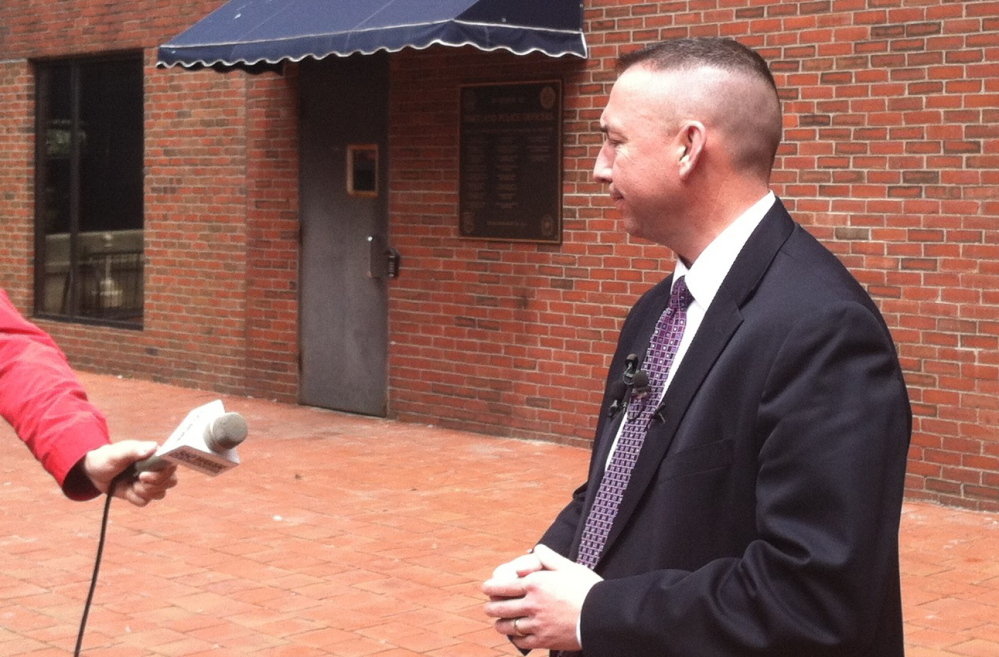Kennedy Park resident John Augustino said he knows of no gangs by name in Portland, but he knows they exist.
He recalled a confrontation last summer in which a young man got beat up at the basketball courts at Fox and Anderson streets. The beating victim left and returned with a gun. His adversary also pulled a gun. They shot at each other, then disappeared before police arrived, Augustino said. Nobody was hurt, he said.
“These guns they have are illegal guns and they are gangs actually,” he said. He has heard that some sell crack cocaine. He believes they are from outside the neighborhood and gather there to drink beer.
But Augustino, who is middle aged and has lived in his home since 2010, has never heard the name True Somali Bloods, even though some people associated with the gang have lived at times in Kennedy Park. Several other residents there and at Riverton Park, another public housing project where some members of the group have lived, said they had never heard the name and were aware of no gang activity.
The True Somali Bloods was one of three groups identified in a Los Angeles Times article Tuesday as violent gangs operating in Portland. The information was attributed to federal officials. The others were the Little Rascals Gang, mostly comprised of people of southeast Asian descent, and the Crips Nation – a group that originated in Los Angeles. The latter two are national groups while True Somali Bloods appears to be homegrown, although its name and red colors suggests a relationship to the national Bloods gang.
In 2010, two dozen suspected gang members were arrested in Greater Portland as part of a national anti-gang effort, and federal officials said some were affiliated with the True Somali Bloods and another gang, the True Sudanese Bloods. Tuesday’s story also said that in 2011, authorities set up an organized crime drug enforcement task force that was granted authority to tap telephones and cell phones of gang suspects.
Residents may not be familiar with the gangs by name because of dwindling membership, diminished activity or because they choose to engage in illegal activity without proclaiming their affiliation. A history of the rival national gangs Crips and Bloods on the Gangs Or Us website says that as members become more serious about drug trafficking, they also try to avoid calling attention to themselves with outward signs of gang affiliation.
Cumberland County Sheriff Kevin Joyce said one inmate currently housed at the county jail is described as a member of the True Somali Bloods.
“There are several other gang members that are housed at the jail now. That’s the only one that would be considered in the (True) Somali Bloods,” Joyce said
Police officials say there are groups that identify themselves as gangs that are involved primarily in the drug trade, and sometimes gang members come north from cities such as Boston and Lowell to sell drugs. But police Tuesday said that the city is not home to rival violent gangs. Portland has not seen the kinds of violence typically associated with national gangs, police said.
“Violent crime was down six percent in the city of Portland,” Police Chief Michael Sauschuck said Wednesday, citing 2013 crime statistics. He declined to discuss specific gangs by name or their numbers.
Sauschuck said the vast majority of people in any community are decent, law abiding people.
“We spend 95 percent of our time dealing with five percent of the population,” he said. “Most of them don’t have a (gang) name, but these are the folks that drive our crime problem.”
Several people interviewed in the city’s housing projects said they were not aware of gang activity and were not familiar with the gang names.
“We actually feel really safe,” said Ayat Basil, a native of Iraq who lives in Kennedy Park. “Some people say there were gangs in 2004 and 2005.”
But just because gangs aren’t showing colors or fighting over turf in Greater Portland doesn’t mean they aren’t active.
William Baker, former police chief in Westbrook and former commissioner of public safety for Massachusetts, said sometimes gang members come to Maine from major cities further south to sell drugs, and then return home. Baker, who also has worked as a law enforcement consultant for the federal government, said he believes the number of Maine gang members is small now but communities need to work to keep it that way.
Wednesday afternoon, Diodonne Mokolo watched his son play basketball at the court at Fox and Anderson streets along with more than a dozen other youths of different ages. He scowled when asked about gang activity in the city.
Mokolo is a single father raising two sons who moved to Portland from Dallas because the state offers a more wholesome environment to raise a family. Mokolo wants to make sure his sons have opportunities for a better life. He feels it would be a waste for them to join a gang.
“I want them to have a good future, good career, not end up behind bars.”
David Hench can be contacted at 791-6327 or at:
dhench@mainetoday.com
Twitter: @Mainehenchman
Send questions/comments to the editors.



Success. Please wait for the page to reload. If the page does not reload within 5 seconds, please refresh the page.
Enter your email and password to access comments.
Hi, to comment on stories you must . This profile is in addition to your subscription and website login.
Already have a commenting profile? .
Invalid username/password.
Please check your email to confirm and complete your registration.
Only subscribers are eligible to post comments. Please subscribe or login first for digital access. Here’s why.
Use the form below to reset your password. When you've submitted your account email, we will send an email with a reset code.